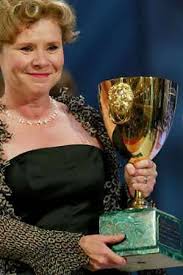Wednesday, March 30, 2005

Vera Drake
Pierce's Rule # 22 - a good one - When in doubt, review something.
I tend to stay clear of depressing subjects because the more skilled the treatment, the more involved I become. My emotions seem to tap from a single source which leaves me a bit drained for any real stuff. However, what with the buzz on this one, plus the fact that Mike Leigh always wrongfoots my preconceptions, *and* that the ladies at my local Silverscreen all expressed flattering interest in my opinion - I grabbed the first one off the shelf.
It's set in a 1950s north London which I do in fact dimly recall for its ration-bound days and spivvy Brylcreemed hairstyles outside the Saturday dance palais (as sported by son Sid). Also, that chirpy London friendliness that Leigh catches in his ear-perfect dialogue - or maybe it was everyone doing their improv / character-exploring thing that Leigh seems to midwife so expertly from his casts.
(Ghastly pun - and there's another one coming up - which I'm keeping in out of honesty to the language of my first reactions.)
First off, despite being English and knowing these characters and their speech, I'm probably the least balanced to pass objective comment because of the surges of nostalgic emotion that envelop me out of the blue and completely distract me from the minutiae of the plot.
Speaking of plot, one of the striking aspects of the story is Vera's matter-of-fact approach to her criminal sideline, made more shocking by the squalid surroundings in which she wields her lye soap and disinfectant.
By way of clever contrast, Leigh runs a parallel story of a girl of privileged background who also finds herself inconveniently pregnant but for whom the escape route is eminently smoother, via urbane Harley Street doc, equally unctuous psychiatrist, and a weekend's genial convalescence between the perfumed sheets of a nursing home somewhere in the country.
The next unfortunate phrase that occurred was the feeling of being 'back in the womb' - a silly enough expression anyway - as I watched the characters move and speak, recognizing and placing each one as precisely as Professor Higgins could slot an accent north or south of Kensington High Street.
I couldn't throw the feeling of being back in England - back in years, even - amid types I probably didn't remember I remembered until tapped by this subtle movie:
- Vera's snooty sister-in-law, encapsulating all the aspirations and middle class snobbery of those post-war days.
- The police, particularly Peter Wight as D.I. Webster
- Perhaps most historically accurate of all, the gentlemen of the Bench - barristers, magistrates, the judge - all in an exalted galaxy miles from any understanding by the humble Vera.
 As for the talk of Imelda Staunton's award-winning portrayal, if *I* had put in a performance like that, I would certainly have nursed hopes of recognition beyond mere nomination.
As for the talk of Imelda Staunton's award-winning portrayal, if *I* had put in a performance like that, I would certainly have nursed hopes of recognition beyond mere nomination.Too near the knuckle, I guess, rather as some ramshackle sets are *so* convincing that people assume they were just there, as opposed to created from scratch by some genius designer.
To choose a moment from the movie, it has to be when the police finally turn up and confront Vera. The camera just fixes on her face. She says nothing, and you need to replay the scene to see the slow switches of emotion ... if I had been an Academician, that's where I would have been sorely torn, over that minute's footage alone.
After word
Well I never. Mike Leigh does it once again. I wonder if I'd have liked to have known this going into the movie or not:- Except for Imelda Staunton, none of the actors knew that the film was about abortion. Each actors only knew what concerned their characters.
- Wow! Just like Secrets and Lies where white mother and black daughter (Blethyn and Jean-Baptiste) had never been introduced prior to when they meet on screen. What a moment that must have been - that trickster, Leigh.
- The budget was so tight, a week of filming had to be cancelled.
- "Filmed with NO script, the film went on to be nominated for Best Original Screenplay." So much for my precious reference to "ear-perfect dialogue".
Mike Leigh had to prepare the screenplay so it could be sent out to academy members, but actually the nominated screenplay never existed. The film itself was the screenplay.
- Leigh asked the actors to hum and, because they couldn't afford to buy rights to songs, the actors had to hum something generic.